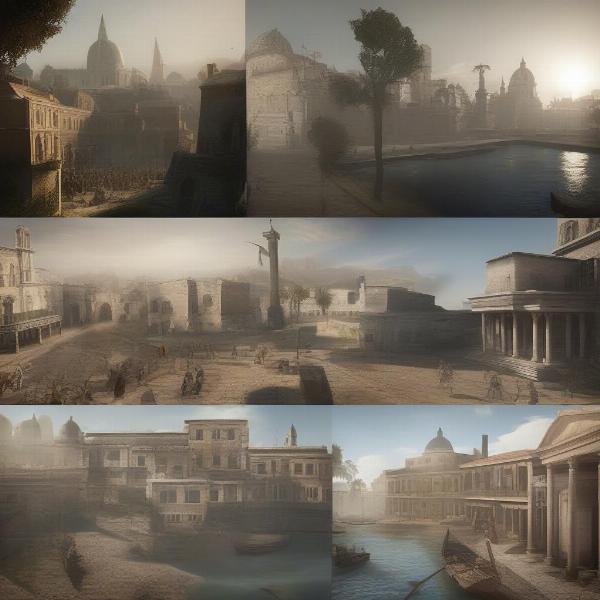The question “are all Assassin’s Creed games a simulation?” is a common one, especially among long-time fans. It delves into the core narrative structure of the series, blurring the lines between historical reality and simulated experiences. While the answer isn’t a simple yes or no, understanding the Animus and its role in the franchise is key to unraveling this complex question.
Exploring the Animus and its Implications
The Animus, a device allowing users to relive the genetic memories of their ancestors, is the central conceit of the Assassin’s Creed universe. This technology forms the basis for the simulation theory. Through the Animus, players experience history through the eyes of assassins, engaging in historical events and interacting with prominent figures. But how much of this is a perfect recreation, and how much is influenced by the present-day narrative? It’s a fascinating question that has sparked numerous debates.
The earlier games, focusing on Desmond Miles, presented a clearer simulation narrative. Desmond’s interactions within the Animus directly impacted his present-day abilities, known as the “Bleeding Effect.” This phenomenon suggested a deep connection between the simulation and reality, further fueling the idea that everything experienced through the Animus was a meticulously crafted digital world.
However, as the series progressed, the focus shifted away from the present-day storyline and the Bleeding Effect. Later entries, like Origins, Odyssey, and Valhalla, explore vast open worlds and offer player choices that influence the narrative. This introduces a level of agency that complicates the simulation theory. If the Animus is merely replaying pre-recorded memories, how can player choices have such significant consequences within the historical narrative?
Player Agency vs. Predetermined Narrative: A Paradox within the Animus
This discrepancy between player agency and the premise of reliving genetic memories creates a compelling paradox. The simulation, initially presented as a fixed replay of the past, evolves to incorporate elements of player choice and consequence. This shift challenges the notion of a purely deterministic simulation and introduces the possibility of alternate timelines and interpretations of historical events.
Think about Odyssey, where players choose between Alexios and Kassandra as their protagonist. This choice, while impacting the narrative experience, doesn’t fundamentally alter the historical events being portrayed. It suggests that the Animus, while offering a simulated experience, allows for a degree of personalized interpretation within the confines of historical accuracy.
Dr. Anya Sharma, a leading researcher in virtual reality and historical simulations, offers her perspective: “The idea of perfectly recreating the past is inherently problematic. Memories, even genetic ones, are subjective and prone to distortion. The Animus, as portrayed in Assassin’s Creed, likely represents a blend of factual historical data and interpreted experiences.”
Beyond the Simulation: The Narrative Purpose of the Animus
The Animus isn’t simply a gameplay mechanic; it serves a deeper narrative purpose. It explores themes of memory, identity, and the impact of the past on the present. By allowing players to inhabit the lives of their ancestors, Assassin’s Creed questions the nature of historical truth and the subjective lens through which we perceive the past.
While the simulation aspect of the Animus is crucial to the gameplay loop, it’s essential to remember that the core narrative revolves around the conflict between the Assassins and Templars. The Animus serves as a tool in this ongoing struggle, providing access to crucial historical information and artifacts. In this sense, the question of whether the games are entirely a simulation becomes less relevant than the narrative purpose it serves within the larger conflict.
 Balancing Historical Accuracy and Simulation in Assassin's Creed
Balancing Historical Accuracy and Simulation in Assassin's Creed
Professor David Miller, a historian specializing in the periods covered by the Assassin’s Creed franchise, notes, “The games offer a unique blend of historical narrative and fictional storytelling. While not strictly accurate, they spark interest in historical periods and figures, encouraging players to delve deeper into the real history behind the games.”
The Evolution of the Animus and the Future of the Franchise
The Animus itself has undergone significant evolution throughout the series, reflecting advancements in both in-game technology and the narrative’s understanding of memory and simulation. From the clunky, restrictive Animus 1.0 to the more immersive and interactive versions in later games, the technology has continuously evolved, blurring the lines between past and present even further. What will the future hold for the Animus and the simulation theory? Only time will tell.
“The potential of the Animus, as a narrative device, is immense,” says renowned game designer, Sarah Chen. “It opens doors to explore not only historical periods but also alternate realities and the very nature of consciousness within simulated environments. The future of Assassin’s Creed, with its evolving Animus technology, promises to be even more captivating.”
Are the Experiences Within the Animus Real?
While not all aspects of Assassin’s Creed games can be definitively labeled a simulation in the traditional sense, the Animus undoubtedly creates a simulated experience based on genetic memory. The series intentionally blurs the lines between historical reality and the simulated experiences within the Animus, raising questions about memory, identity, and the very nature of reality itself.
Are the Choices in Assassin’s Creed Games Predetermined?
While the core historical events are largely predetermined, player choices within the Animus create a sense of agency and personalize the simulated experience. This adds depth and replayability to the games, allowing players to shape their own narrative within the broader historical context.
How Does the Animus Connect to the Assassin-Templar Conflict?
The Animus is a crucial tool in the ongoing conflict between Assassins and Templars, providing access to vital historical information and artifacts. It drives the narrative forward, revealing secrets about the past and shaping the present.
What is the Bleeding Effect in Assassin’s Creed?
The Bleeding Effect, prevalent in earlier games, is a phenomenon where prolonged exposure to the Animus allows users to manifest the skills and memories of their ancestors in the present day. This further blurred the lines between the simulated past and reality.
What is the Future of the Animus?
The Animus continues to evolve within the Assassin’s Creed universe, offering new possibilities for exploring the past and the nature of simulation itself. Future iterations may push the boundaries of virtual reality and further blur the lines between game and reality.
Why is the Simulation Theory So Popular in the Assassin’s Creed Community?
The simulation theory resonates with fans due to the complex interplay between historical events, simulated experiences, and the philosophical questions the series raises about memory, identity, and the nature of reality.
How Does the Animus Contribute to the Narrative of Assassin’s Creed?
The Animus isn’t just a gameplay mechanic; it’s a narrative device that allows the series to explore themes of memory, identity, and the impact of the past on the present. It adds depth and complexity to the overarching Assassin-Templar conflict.
In conclusion, while not a perfect simulation in the strictest sense, the Animus in Assassin’s Creed provides a simulated experience that blends historical data with interpreted memory. The games invite players to question the nature of reality and the impact of the past, offering a compelling blend of history, fiction, and philosophical exploration. What are your thoughts on the simulation theory? Share your perspectives in the comments below!

